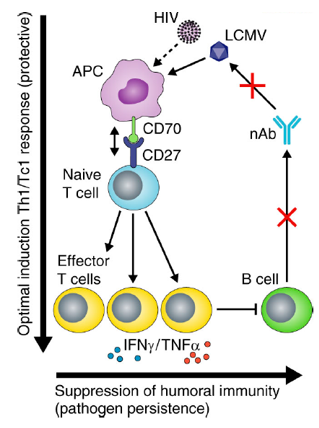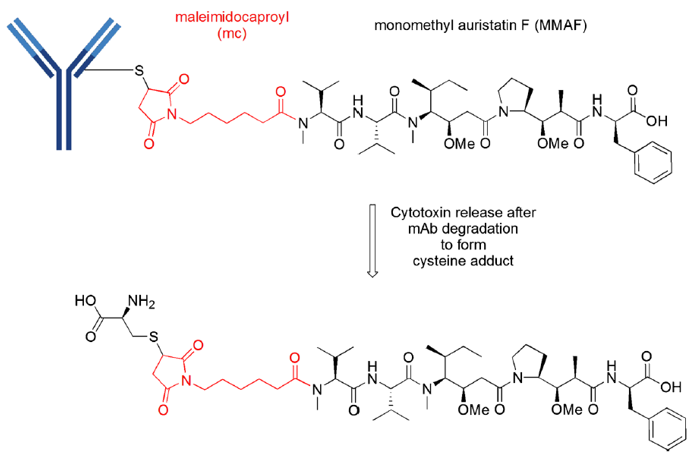ADC Development Services Targeting CD70
Antibody-drug conjugates (ADCs) represent a promising therapy to improve treatment outcome of cancer, which take advantage of the specificity of a monoclonal antibody and the potent cytotoxicity of the small molecular agent. To date, several ADCs have been approved for the treatment of different types of cancer. Creative Biolabs is focusing on discovering and developing novel and targeted drug products such as therapeutic antibody and ADCs. With advanced technology platforms, we provide clients the complete set of ADCs development services targeting the CD70 marker.
Introduction of CD70
CD70, also known as CD27L or TNFSF7, is encoded by the CD70 gene. The protein is a member of the tumor necrosis factor (TNF) ligand family. It is a cytokine serving as a ligand of TNFRSF27/CD27. CD70 is a type II transmembrane glycoprotein with a molecular mass of 50kDa, composed of 193 amino acids. It is mainly expressed on the activated T and B lymphocytes. It interacts with CD27 via a homotrimer form. Upon interacting with CD27, it induces the binding of CD27 with TNF receptor-associated factors (TRAFs), such as TRAF2 and TRAF5, then activates the NF-κB and c-Jun kinase pathways, causing proliferation of costimulated T cells, differentiation and activation of cytolytic T cells. In addition, this cytokine also plays a role in the regulation of B-cell activation, cytotoxic function of NK cells, and immunoglobulin production. CD70 has been considered as a novel target in human disease therapy such as malignancies.
 Fig.1 Strong effector cell formation and protective antiviral antibody responses may be mutually exclusive during chronic viral infection. (Nolte, 2006)
Fig.1 Strong effector cell formation and protective antiviral antibody responses may be mutually exclusive during chronic viral infection. (Nolte, 2006)
Anti-CD70 ADC for Non-Hodgkin Lymphoma (NHL)
Vorsetuzumab mafodotin (SGN-75) is an ADC targeting the CD70, which consists of an anti-CD70 humanized monoclonal antibody (vorsetuzumab) and a non-cleavable linker with monomethyl auristatin F (MMAF). Preclinical study results showed that SGN-75 can induce durable tumor regression of lymphoma cells. The ADC presented a pre-clinical safety profile that facilitates the progress towards clinical evaluation. To date, the phase I clinical trials of the ADC for NHL and RCC therapy has been completed.
 Fig.2 Construct of a mc-MMAF ADC. (Jain, 2015)
Fig.2 Construct of a mc-MMAF ADC. (Jain, 2015)
BMS‑936561 (also known as MDX‑1203) is another ADC composed of an anti-CD70 human immunoglobulin G1 (IgG1) monoclonal antibody covalently conjugated to a toxic drug, MED-2460 or duocarmycin, via a peptide-based linker. Once the ADC combined with the CD70 and internalized in the tumor cells, MED-2460 can be released by the cathepsin B proteolytic cleavage of the Val-Cit peptide linker. The potent drug is a cytotoxic DNA minor groove-binding alkylating (MGBA) agent that can induce the death of tumor cells. Preclinical studies demonstrated that the ADC has significant antitumor activity and safe and well-tolerated.
Anti-CD70 ADC for Renal Cell Carcinoma (RCC)
CD70 is also a potential target in RCC treatment. AMG 172 is an ADC comprised of an anti-CD70 antibody linked to a semisynthetic derivative of the ansamycin antibiotic DM1 through the non-cleavable linker 4-[N-maleimidomethyl] cyclohexane-1-carboxylate. The antibody portion of AMG 172 recognizes the CD70 and then is internalized into CD70 expressing cells. Subsequently, the drug component of AMG 172 is catabolized to release, which inhibits microtubule assembly/disassembly dynamics and induces cell apoptosis. AMG 172 presents positive antitumor activity in preclinical models and is investigated in the Phase 1 clinical study.
SGN-CD70A is a novel ADC that consists of an anti-CD70 monoclonal antibody conjugated to a synthetic DNA cross-linking molecule, pyrrolobenzodiazepine (PBD) dimer. The ADC is under phase I clinical trials for RCC, mantle-cell, diffuse large B-cell, and follicular lymphoma currently. Preclinical trials demonstrated that SGN-CD70A significantly inhibited cell growth of CD70-positive tumor cell lines. In addition, SGN-CD70A can cause apoptosis, cell death and inhibit cell proliferation of patient-derived T cell lymphoma primary cells. Therefore, SGN-CD70A is a promising therapeutic agent for T cell lymphomas.
Vorsetuzumab mafodotin (SGN-75) and BMS‑936561 are also investigated in the RCC treatment not only in the NHL therapy.
What Can We Do for You?
Empowered by our advanced drug discovery and analysis platforms and experienced technical personnel, Creative Biolabs is fully competent and dedicated to serving as your one-stop-shop for ADC construction and characterizations. Creative Biolabs offers a comprehensive set of ADC development services against CD70 for clients all over the world. If you are interested in our service, please do not hesitate to contact us for more details.
Our ADCs services including but not limited to:
- ADC Antibody Screening
- DrugLnk™ Custom Synthesis
- Antibody Design and Conjugation
- ADC in vitro Analysis
- ADC in vivo Analysis
References
- Nolte, M. A.; van Lier, R. A. The price of the CD27–CD70 costimulatory axis: you can't have it all. Journal of Experimental Medicine. 2006, 203(11): 2405-2408.
- Jain, N., Smith, S. W.; et al. Current ADC linker chemistry. Pharmaceutical research. 2015, 32 (11): 3526-3540.
For Research Use Only. NOT FOR CLINICAL USE.
Related Sections
ADC Applications in Diseases Research:
Welcome! For price inquiries, please feel free to contact us through the form on the left side. We will get back to you as soon as possible.
Contact usUSA
Tel:
Fax:
Email:
Europe
Tel:
Email:
Germany
Tel:
Email:

